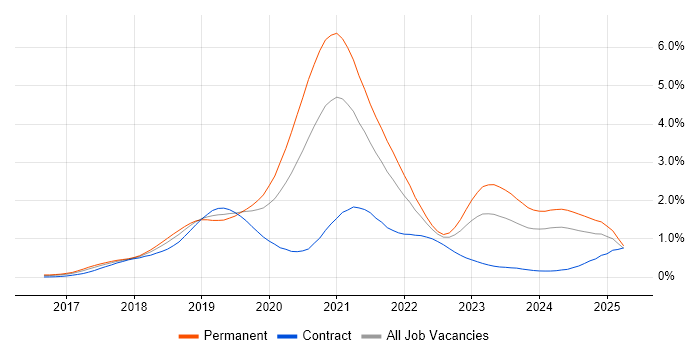.NET Core
South East > Thames Valley
The table below provides summary statistics and salary benchmarking for jobs advertised in the Thames Valley requiring .NET Core skills. It covers permanent job vacancies from the 6 months leading up to 23 February 2026, with comparisons to the same periods in the previous two years.
| 6 months to 23 Feb 2026 |
Same period 2025 | Same period 2024 | |
|---|---|---|---|
| Rank | 153 | 117 | 130 |
| Rank change year-on-year | -36 | +13 | +66 |
| Permanent jobs citing .NET Core | 11 | 53 | 106 |
| As % of all permanent jobs in the Thames Valley | 0.25% | 1.70% | 1.94% |
| As % of the Libraries, Frameworks & Software Standards category | 2.97% | 8.10% | 9.42% |
| Number of salaries quoted | 11 | 48 | 105 |
| 10th Percentile | £45,000 | - | £42,500 |
| 25th Percentile | £50,000 | £36,250 | £45,000 |
| Median annual salary (50th Percentile) | £55,000 | £37,500 | £55,000 |
| Median % change year-on-year | +46.67% | -31.82% | -8.33% |
| 75th Percentile | £75,000 | £52,813 | £64,750 |
| 90th Percentile | - | £60,000 | £71,250 |
| South East median annual salary | £60,000 | £52,500 | £55,000 |
| % change year-on-year | +14.29% | -4.55% | -8.33% |
All Software Libraries and Frameworks
Thames Valley
.NET Core falls under the Software Libraries and Frameworks category. For comparison with the information above, the following table provides summary statistics for all permanent job vacancies requiring technical specification, industry standards, software libraries and framework skills in the Thames Valley.
| Permanent vacancies with a requirement for technical specification, industry standards, software libraries and framework skills | 370 | 654 | 1,125 |
| As % of all permanent jobs advertised in the Thames Valley | 8.35% | 20.95% | 20.54% |
| Number of salaries quoted | 278 | 392 | 895 |
| 10th Percentile | £36,250 | £36,250 | £37,500 |
| 25th Percentile | £50,000 | £47,500 | £47,500 |
| Median annual salary (50th Percentile) | £65,000 | £62,500 | £59,000 |
| Median % change year-on-year | +4.00% | +5.93% | -1.67% |
| 75th Percentile | £73,750 | £81,250 | £77,500 |
| 90th Percentile | £85,000 | £87,500 | £92,500 |
| South East median annual salary | £60,000 | £60,000 | £57,500 |
| % change year-on-year | - | +4.35% | -4.17% |
.NET Core
Job Vacancy Trend in the Thames Valley
Historical trend showing the proportion of permanent IT job postings citing .NET Core relative to all permanent IT jobs advertised in the Thames Valley.

.NET Core
Salary Trend in the Thames Valley
Salary distribution trend for jobs in the Thames Valley citing .NET Core.

.NET Core
Salary Histogram in the Thames Valley
Salary distribution for jobs citing .NET Core in the Thames Valley over the 6 months to 23 February 2026.
.NET Core
Job Locations in the Thames Valley
The table below looks at the demand and provides a guide to the median salaries quoted in IT jobs citing .NET Core within the Thames Valley region over the 6 months to 23 February 2026. The 'Rank Change' column provides an indication of the change in demand within each location based on the same 6 month period last year.
| Location | Rank Change on Same Period Last Year |
Matching Permanent IT Job Ads |
Median Salary Past 6 Months |
Median Salary % Change on Same Period Last Year |
Live Jobs |
|---|---|---|---|---|---|
| Oxfordshire | -12 | 5 | £75,000 | +100.00% | 4 |
| Buckinghamshire | -12 | 4 | £65,000 | +18.18% | 1 |
| Berkshire | -13 | 2 | £43,750 | +23.24% | 5 |
| .NET Core South East |
|||||
.NET Core
Co-Occurring Skills & Capabilities in the Thames Valley by Category
The following tables expand on the one above by listing co-occurrences grouped by category. They cover the same employment type, locality and period, with up to 20 co-occurrences shown in each category:
